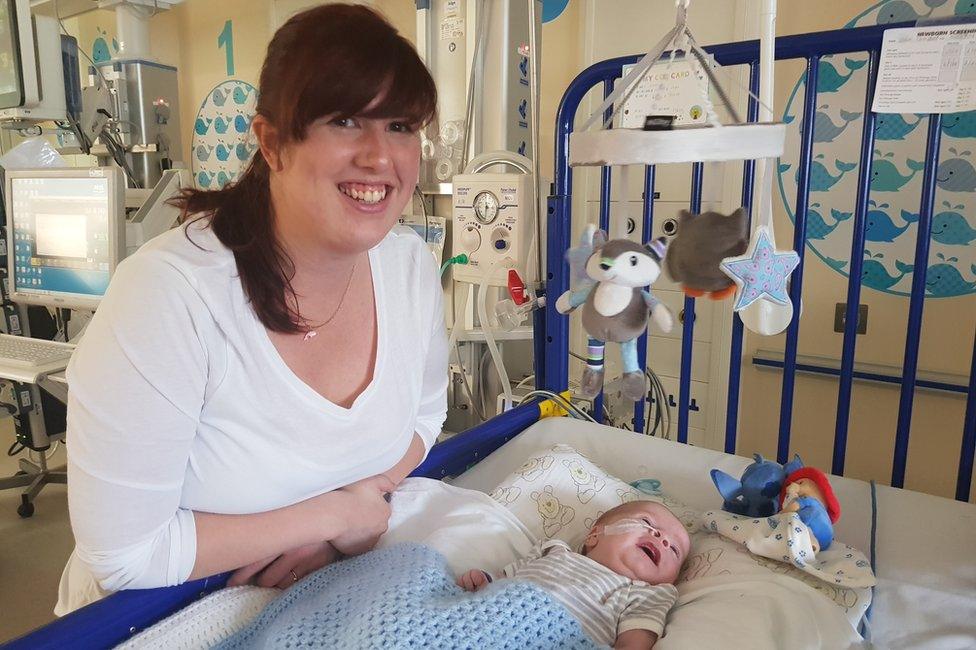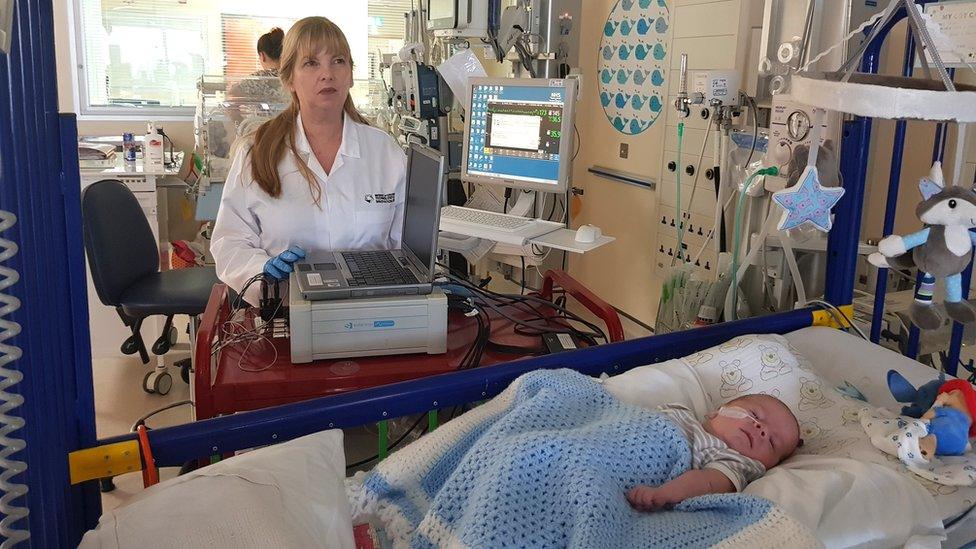Blood test trial in Glasgow to avoid using needles on sick babies
- Published

The trial is a joint venture between experts at the University of Strathclyde and the Royal Hospital for Children in Glasgow
Premature and sick babies could avoid painful blood tests in the future if a Scottish trial is successful.
Scientists are developing a system which would allow medics to monitor infants' blood chemistry levels through their skin.
The tests currently require heel blood samples or blood taken from a vein.
A University of Strathclyde team is looking at whether levels of glucose and lactate can instead be collected through the skin onto a patch.
Experts say the current tests can be distressing and potentially cause complications when infants are already vulnerable.
A clinical trial is now under way with the medical team at the neonatal unit of the Royal Hospital for Children in Glasgow.
If the technique is found to work, it will be transferred into a future medical device in the form of a wireless patch sensor that could be used for any sick baby.
Impact on development
Consultant paediatrician Helen McDevitt said trying to get blood out a baby's tiny veins can be technically very difficult.
She said: "We have to take blood samples using needles from them multiple times a day, and that is associated with pain and distress.
"Obviously we want to minimise that but it's a necessary thing, so to be able to get those measurements painlessly through their skin without doing the blood test would be enormously beneficial to the babies.
"Some of the babies are as small as a bag of sugar, and trying to get blood out of those tiny little veins can actually be technically very difficult. Then when we do multiple blood tests we also have to replace the blood that we've taken from them...by giving them blood transfusions.
"There is emerging evidence that repeatedly doing painful things to babies in intensive care has an adverse impact on their development.
"It's sensitising their neuro pathways and perhaps that then impacts on their development not being normal in later life."

'You can't progress unless people say yes'

Emma Campbell-Reid's son Orion was born prematurely and is waiting for a heart operation
New mother Emma Campbell-Reid said she was more than happy to allow her son Orion to take part in the trial.
Orion was born prematurely and is now 12 weeks old. He is waiting for a heart operation which surgeons will perform when he reaches a suitable weight.
Emma, from Aberdeen, said: "You can't progress unless people say yes to things.
"My gran was here when one of the first blood tests was taking place and she got a bit squeamish about it, and I think a lot of people feel the same.
"They do have to get quite a fair bit out and it does take a while so at least this is a bit more instant.
"They gave us the information and we've seen how it works in here. We've seen him get his bloods taken but we're quite lucky because he is a content baby.
"You can hear other babies who are not agreeing with it and sometimes they can't even get a sample out.
"So this is non-invasive. We were there when they first tried it and he was completely fine with it."

Professor Patricia Connolly, from the university's biomedical engineering department, is hopeful the system could lead to babies being monitored by wearable devices without the need for any needles.
She said "We can collect the levels in a special type of gel electrode, and the levels are also compared to the level of glucose in the blood samples that are still being routinely taken by medical staff.
"Through our research we aim to show that what we take through the skin can be calibrated against what's in the blood."

Prof Connolly hopes the trial could mean fewer blood tests using needles
Prof Connolly added: "If the trial confirms this, then it opens up the way for wearable devices to monitor these babies through the skin, without taking any blood or using a needle.
"The wearable system would also mean that parents won't have the distress of watching their babies having blood sampled and would also minimise the amount of blood being taken at a time when babies are already challenged."